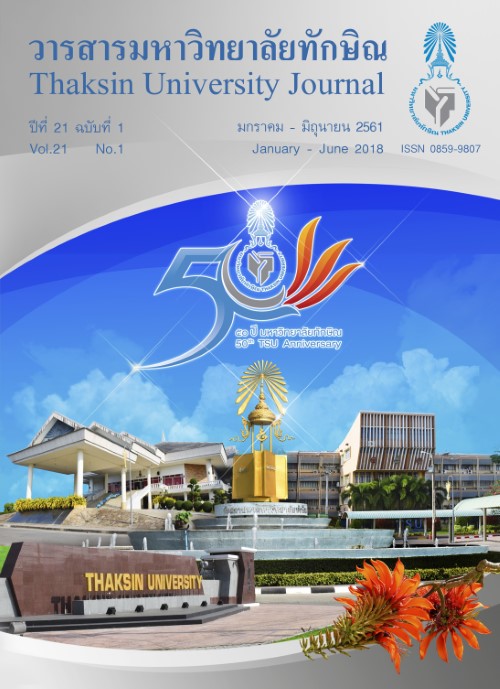Comparison of Microbial Contamination-Reducing Method of Sand Ginger Powder by Steam Sterilization and Potassium Permanganate Soaking
Main Article Content
Abstract
The purpose of this research was to study the quality of sand ginger powder by steam sterilization and potassium permanganate soaking. Fresh sand ginger rhizome was divided into 3 groups with the total of 6 treatments. The first group was steam sterilized at 121๐C for 15 minutes or 115๐C for 15 or 30 minutes. The second group was soaked in KMnO4 solution at the concentration of 100 or 200 ppm for 60 minutes. The third group was the control group. The finding reveals that steam sterilization of Sand Ginger at 121๐C for 15 minutes was microbial contamination free. The semples of steam sterilization at 115๐C for 30 minutes and soaked in KMnO4 solutions at the concentration of 100 or 200 ppm for 60 minutes have been contaminated but have passed the microbial contamination standard criteria of Thai Herbal Pharmacopoeia. Therefore, the method of soaking in KMnO4 solution at a concentration of 200 ppm 60 minutes is the most appropriate method when consider with the cost of production.
Article Details

This work is licensed under a Creative Commons Attribution-NonCommercial-NoDerivatives 4.0 International License.
References
Samcharoen Panich.
[2] Wuthithammawet, Wuthi. (1997). Saranukrom Samunphrai. Bangkok: Odian store.
[3] Chaiyawat, C., Jamtaweekul, J., Wongpentak, S. and Inthongkaew, P. (2014). “Safety of Herbal Medicines in
the National List of Essential Medicines”, Bulletin of the Department of Medical Sciences. 56(3), 123-134.
[4] Chaowalit, M. (2013). “Gamma Irradiation: Sterilization Procedure for Herbal Products”, Thai Bull Pharm
Sciences. 8(1), 41-54.
[5] Chusri, C., Subhadhirasakul, S., Tahyoh, N., Billateh, C., Chaowuttikul, C., Chorachoo, J. and Voravuthi Kunchai,
S.P. (2012). “Effect of Different Decontamination Methods on Microbiological Aspects, Bioactive
Constituents and Antibacterial Activity of Turmeric (Curcuma longa Linn.) Powder”, European Journal
of Medicinal Plants. 2(4), 276-289.
[6] Keereekoch, T., Srisuwan, T., Taleh, R., Hemtrakoonwong, R., Chesa-E, S. and Subhadhirasakul S. (2014).
“Effects of Steam Sterilization Time and Temperature on Quality of Turmeric Powder (Curcuma longa L.)”,
Thaksin University Journal. 17(1), 57-67.
[7] Keereekoch, T., Srisuwan, T., Patimin, S., Khunphan, R., Yayaman, A., Dinteb, H. and Subhadhirasakul, S.
(2016). “Effects of Steam Sterilization and Potassium Permanganate Soak on Microbial Load and Quality
of Ginger Powder”, Thaksin University Journal. 19(2), 9-21.
[8] Srisuwan, T., Keereekoch, T., Chikasem, I., Da-o, A., Salaemae, M., Saleh, A. and Subhadhirasakul, S.
(2016). “Development of the Preparation Methods for Qualified Cassumunar Ginger Powder Based
on Thai Herbal Pharmacopoeia Standards”, Thaksin University Journal. 19(2), 53-65.
[9] World Health Organization (WHO). (1998). Quality Control Methods for Medicinal Plant Materials.
Geneva, ISBN 92 415 45100 (NLM Classification QV 766).
[10] Ministry of Public Health. (2009). Thai Herbal Pharmacopoeia. Vol.3, Department of Medical Sciences,
Bangkok: Prachachon.
[11] Tunsaringkarn, T., Palanuvej, C., Rungsiyothin A., Issaravanich, S., Vipunngeun, N., Chuthaputti, A. and
Ruangrungsi, N. (2007). “Pharmacognostic Specification of Kaemapferia Galanga Rhizome in Thailand”,
Journal of Health Research. 21(3), 207-214.
[12] Ministry of Public Health. (2009). Thai Herbal Pharmacopoeia. Department of Medical Sciences, Bangkok:
Prachachon.


